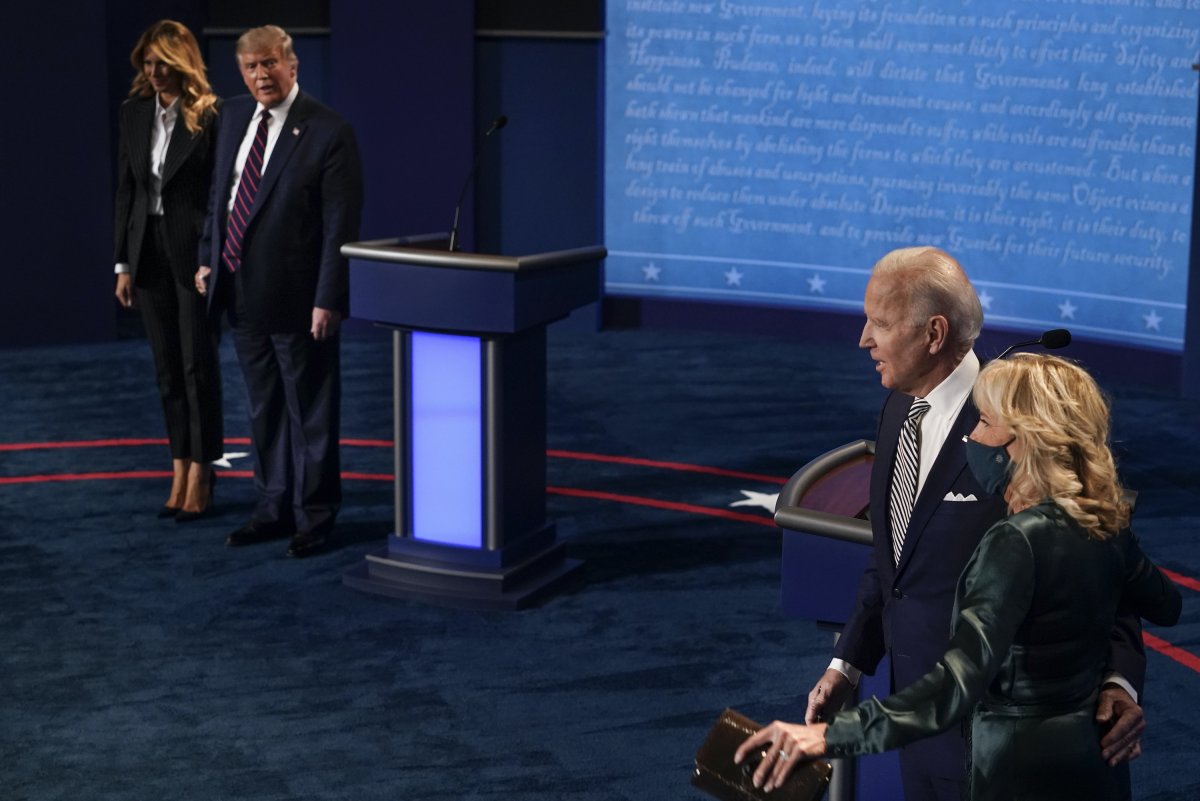Last Tuesday, voters tuned in to what they hoped would be a substantive discussion of the serious challenges facing our republic. Instead, many came away with the unsettling suspicion that our two-party system has no clothes.
American voters want answers and they want hope. That's not just because of the pandemic. Some Louisiana residents just barely have electricity reconnected, five weeks after Hurricane Laura. In the meantime, two subsequent hurricanes made landfall in the Gulf. Many in California, Oregon and Washington remain homeless as a result of fires that continue to burn. Iowa lost 30 percent of its annual harvest to a freak derecho.
And on top of the jarring climate-related suffering, Americans also worry that the homeless camps springing up in public parks and alongside freeways speak of something endemic to our economic system—even if they can't quite put their finger on the problem. Is it globalization? Is it the unworthy faith we placed in trickle-down economics? Is it a more general failure of our most important institutions? Why has the pandemic—like the housing crunch of 2008-9 before it—been allowed to make the rich richer and the poor poorer?
So to see the nominees of our two major parties quibbling like rivals on an elementary school playground makes for difficult listening.
Outside the core of committed partisans on each side, Americans struggle with the idea that the strongest argument for electing Joe Biden is "Trump," and main justification for reelecting Donald Trump is "Biden and Harris."
This same partisanship stands in the way of solving our nation's problems. For example, going well back into the Obama years, polls have shown that 80 percent of Americans would like to see a merciful solution to the predicament faced by DACA students. Yet Congress fails to act. For Republicans, such action would require allowing Democrats to claim victory on an issue perceived as belonging to them. For Democrats, it would mean giving up an ongoing fight that continues to bring them votes, donations and an army of volunteers for the ground game.
In a similar symbiotic relationship, both parties raise money and volunteers over abortion. When Republicans had the opportunity to push for a Personhood Amendment—a major goal of the pro-life movement—George W. Bush and Karl Rove showed no interest. An even stranger spectacle occurred this year in the Democratic Party. Only about 20 percent of Democrats support any-time-for-any-reason access to abortion, with the government picking up the cost, yet the entire early field of Democratic presidential hopefuls targeted that narrow faction, ignoring the larger group of voters who would prefer some limits. The 21 million pro-life Democrats feel abandoned.
Third parties may rarely win election to office, but they do serve to introduce the new ideas that the duopoly candidates cannot. Rocking the boat with new ideas is anathema to established institutions. But established parties are often open to stealing a good idea that's gained traction.

As the presidential candidate of the American Solidarity Party, I can testify that we have lots of good ideas, but only the beginnings of an institution. We have no paid staff, but volunteers at every level. We've hired no marketing or advertising companies. We rely on social media and word of mouth. As a retired junior high school history teacher, I am—at best—an amateur candidate.
Yet this election cycle will see us jump from the third tier of American parties to the second. Out of some fifty political parties in the United States, we finished 14th in 2016. This year we are eyeing fifth, and in 2024, even better. Or perhaps the duopoly parties will steal our platform. We win either way.
The American Solidarity Party believes every human life deserves respect, protection and treatment with dignity, from inside the womb until natural death. We oppose abortion, assisted suicide, capital punishment and anything that encourages people to choose them. We support universal health care and increased tax allowances for dependents. We support elevating the salary and the training of child care and elder care workers, and providing a path to citizenship for the many who are undocumented.
The dignity we desire for every person will require major advances in social justice. Neighborhoods that shriveled under redlining will need reparative attention. School systems and access to medical care will need upgrading. A healthy debate is already underway concerning changes in policing, courts and prisons. Some changes have begun, but we need to accelerate the action.
The foundation of any nation must be healthy communities built around strong families. Communities thrive when local businesses, schools, recreational clubs, service organizations and religious associations each contribute their part, and within them, most residents can find the support of family and friends.
Robust communities also require well-rounded economies. Today, in the world's richest country, 40 percent of our neighbors have a net financial worth ranging from zero to a negative. We must foster an expanding ownership class, making it easier for new talent to get started. Too-big-to-fail banks need to be split up into local banks that will invest in local entrepreneurs. The playing field has been tilted too long in the direction of big chains and big box stores. We need to tilt it back in ways that will strengthen local growth.
All of this will come to naught, however, if we do not urgently act to protect our climate. We know what connects the hurricanes, wildfires, droughts, rising sea levels and extreme summers and winters. We know that warming has allowed tropical diseases and their insect vectors to migrate ever northward. We know that oceanic plankton, critical to the oxygen cycle that provides the air we breathe, are approaching their limit of tolerance. What we lack is the political will to make the necessary changes. We are at a triage moment. If we do not act now, we may soon be looking back on 2020 as the good old days.
Without addressing climate change, our military budget would need to balloon to keep up with ever-increasing waves of people fleeing drought, rising sea levels and the wars both will ignite. The best use of our money is to put it toward efforts that will reduce the chance of war.
Each of America's third parties brings something new to the marketplace of ideas. On Thursday, October 8, the Fair and Equal Elections Foundation will livestream an Open Presidential Debate from Denver, at 6:00 PM mountain time. I guarantee it will be a better display of American ideals than the debate we just witnessed.
Presidential candidate Brian Carroll represents the American Solidarity Party. He is a retired history teacher, having divided a 40-year career between California and a mission school in Colombia.
The views expressed in this article are the author's own.
Uncommon Knowledge
Newsweek is committed to challenging conventional wisdom and finding connections in the search for common ground.
Newsweek is committed to challenging conventional wisdom and finding connections in the search for common ground.
About the writer
To read how Newsweek uses AI as a newsroom tool, Click here.






